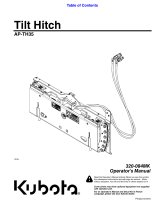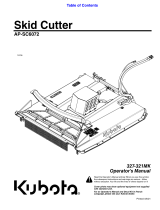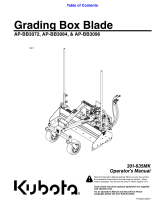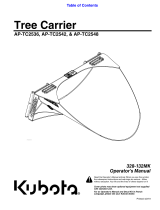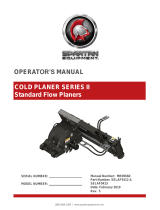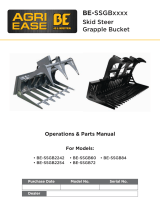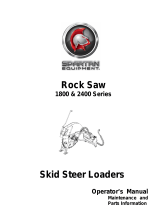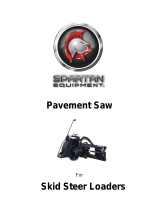Page is loading ...

Table of Contents
Cover photo may show optional equipment not supplied
with standard unit.
For an Operator’s Manual and Decal Kit in French
Language, please see your Kubota dealer.
Read the Operator’s Manual entirely. When you see this symbol,
the subsequent instructions and warnings are serious - follow
without exception. Your life and the lives of others depend on it!
!
Cold Planer
AP-CP30 Series
350-376MK
Operator’s Manual
Printed 6/13/19
CP30 Series of Low-Flow Cold Planers CP30 Series of High-Flow Cold Planers
72082
72083
Low Flow Models: CP3012LF and CP3016LF,
High Flow Models: CP3018, CP3024, CP3030, CP3040, and CP3048

6/13/19AP-CP30 Series Cold Planer 350-376MK
Machine Identification
Record your machine details in the log below. If you replace this manual, be sure to transfer this information to the new
manual.
If you, or the dealer, have added Options not originally ordered with the machine, or removed Options that were
originally ordered, the weights and measurements are no longer accurate for your machine. Update the record by
adding the machine weight and measurements provided in the Specifications & Capacities Section of this manual with
the Option(s) weight and measurements.
Dealer Contact Information
Model Number
Serial Number
Machine Height
Machine Length
Machine Width
Machine Weight
Delivery Date
First Operation
Accessories
Name:
Street:
City/State:
Telephone:
Email:
WARNING: Cancer and reproductive harm - www.P65Warnings.ca.gov
!
California Proposition 65

Table of Contents
© Copyright 2019 All rights Reserved
Kubota provides this publication “as is” without warranty of any kind, either expressed or implied. While every precaution has been taken in the preparation of this manual, Kubota
assumes no responsibility for errors or omissions. Neither is any liability assumed for damages resulting from the use of the information contained herein. Kubota reserves the right
to revise and improve its products as it sees fit. This publication describes the state of this product at the time of its publication, and may not reflect the product in the future.
Kubota is a registered trademark.
All other brands and product names are trademarks or registered trademarks of their respective holders.
Printed in the United States of America.
6/13/19
AP-CP30 Series Cold Planer 350-376MK
Table of Contents
Important Safety Information . . . . . . . . . . . . . 1
Safety at All Times . . . . . . . . . . . . . . . . . . . . . . . . . 1
Look for the Safety Alert Symbol . . . . . . . . . . . . . . . 1
Safety Labels . . . . . . . . . . . . . . . . . . . . . . . . . . . . . 6
Introduction . . . . . . . . . . . . . . . . . . . . . . . . . . 12
Application . . . . . . . . . . . . . . . . . . . . . . . . . . . . . . 12
Using This Manual . . . . . . . . . . . . . . . . . . . . . . . . 12
Owner Assistance . . . . . . . . . . . . . . . . . . . . . . . . . 12
Section 1: Assembly & Set-up . . . . . . . . . . . 13
Skid Steer Requirements . . . . . . . . . . . . . . . . . . . 13
Torque Requirements . . . . . . . . . . . . . . . . . . . . . . 13
Before You Start . . . . . . . . . . . . . . . . . . . . . . . . . . 13
Skid Steer Shutdown Procedure . . . . . . . . . . . . . . 13
Dealer Set-up . . . . . . . . . . . . . . . . . . . . . . . . . . . . 14
Safety Decals . . . . . . . . . . . . . . . . . . . . . . . . . . . 14
Low-Flow Cold Planer Set-up . . . . . . . . . . . . . . . . 14
Hydraulic Couplers . . . . . . . . . . . . . . . . . . . . . . . 14
Hydraulic Hoses and Fittings . . . . . . . . . . . . . . . 14
Drum Assembly . . . . . . . . . . . . . . . . . . . . . . . . . 14
High-Flow Cold Planer Set-up . . . . . . . . . . . . . . . . 15
Hydraulic Couplers . . . . . . . . . . . . . . . . . . . . . . . 15
Hoses and Fittings . . . . . . . . . . . . . . . . . . . . . . . 15
Wire Harness . . . . . . . . . . . . . . . . . . . . . . . . . . . 15
Drum Assembly . . . . . . . . . . . . . . . . . . . . . . . . . 15
Motor Case Drain . . . . . . . . . . . . . . . . . . . . . . . . 15
Section 2: Operating Procedures . . . . . . . . . 16
General Safety Information . . . . . . . . . . . . . . . . . . 16
Hook-up Cold Planer . . . . . . . . . . . . . . . . . . . . . . . 17
Hydraulic Hose Hook-up . . . . . . . . . . . . . . . . . . . . 18
Electrical Hook-up . . . . . . . . . . . . . . . . . . . . . . . . . 20
Pre-Operation Inspection . . . . . . . . . . . . . . . . . . . 22
Check Equipment Clearances . . . . . . . . . . . . . . . . 22
Basic Operation . . . . . . . . . . . . . . . . . . . . . . . . . . 23
Operating the Low-Flow Cold Planer . . . . . . . . . 23
Operating the High-Flow Cold Planer . . . . . . . . . 24
Transporting . . . . . . . . . . . . . . . . . . . . . . . . . . . . . 25
Unhook Cold Planer . . . . . . . . . . . . . . . . . . . . . . . 25
Section 3: Options & Accessories . . . . . . . . 26
Picks (Accessory) . . . . . . . . . . . . . . . . . . . . . . . . . 26
Water Spray Kit (Accessory) . . . . . . . . . . . . . . . . . 26
Section 4: Maintenance & Lubrication . . . . . 27
Maintenance . . . . . . . . . . . . . . . . . . . . . . . . . . . . . 27
Servicing Drivetrain Components . . . . . . . . . . . . . 27
Cutting Drum Maintenance . . . . . . . . . . . . . . . . . . 27
Remove & Install Picks . . . . . . . . . . . . . . . . . . . . . 28
Pick Holder Repair . . . . . . . . . . . . . . . . . . . . . . . . 28
Planetary Gearbox Oil Change . . . . . . . . . . . . . . . 29
Long-Term Storage . . . . . . . . . . . . . . . . . . . . . . . . 29
Lubrication Points . . . . . . . . . . . . . . . . . . . . . . . . . 30
Low-Flow Cold Planers . . . . . . . . . . . . . . . . . . . 30
Sideshift Bars . . . . . . . . . . . . . . . . . . . . . . . . . . .30
Dead Shaft Bearing . . . . . . . . . . . . . . . . . . . . . .30
Depth Jack . . . . . . . . . . . . . . . . . . . . . . . . . . . . .31
Tilt Jack . . . . . . . . . . . . . . . . . . . . . . . . . . . . . . .31
High-Flow Cold Planers . . . . . . . . . . . . . . . . . . . 32
Sideshift Bars . . . . . . . . . . . . . . . . . . . . . . . . . . .32
Left and Right Depth Skids . . . . . . . . . . . . . . . .32
Dead Shaft Bearing . . . . . . . . . . . . . . . . . . . . . .33
Depth Cylinder Pivot Pins . . . . . . . . . . . . . . . . .33
Planetary Gearbox . . . . . . . . . . . . . . . . . . . . . . .33
Section 5: Specifications & Capacities . . . . . 34
Section 6: Features & Benefits . . . . . . . . . . . 35
Section 7: Troubleshooting . . . . . . . . . . . . . . 36
Section 8: Torque Values Chart . . . . . . . . . . . 37
Section 9: Warranty & Legal Disclaimer . . . . 38

Table of Contents Continued
Parts Manual QR Locator
The QR (Quick Reference) code on the
cover and to the left will take you to the
Parts Manual for this equipment.
Download the appropriate App on your
smart phone, open the App, point your
phone on the QR code and take a picture.
Dealer QR Locator
The QR code on the left will
link you to available dealers
for Kubota products. Refer to
Parts Manual QR Locator on
this page for detailed
instructions.
Table of Contents
6/13/19AP-CP30 Series Cold Planer 350-376MK
See previous page for Table of Contents.

Important Safety Information
6/13/19
1
Important Safety Information
Listed below are common practices that may or may not be applicable to the products
described in this manual.
Safety at All Times
Careful operation is your best
assurance against an accident.
All operators, no matter how much
experience they may have, should
carefully read this manual and
other related manuals, or have the
manuals read to them, before
operating the power machine and
this attachment.
Thoroughly read and understand
the “Safety Label” section. Read
all instructions noted on them.
Do not operate the equipment
while under the influence of drugs
or alcohol as they impair the ability
to safely and properly operate the
equipment.
Operator should be familiar with all
functions of the skid steer and
attachment and be able to handle
emergencies quickly.
Make sure all guards and shields
appropriate for the operation are in
place and secured before
operating the attachment.
Keep all bystanders away from
equipment and work area.
Start skid steer from the driver’s
seat with steering levers and
hydraulic controls in neutral.
Operate skid steer and controls
from the driver’s seat only.
Never dismount from a moving
skid steer or leave skid steer
unattended with engine running.
Do not allow anyone to stand
between attachment and skid
steer while hooking-up.
Keep hands, feet, and clothing
away from power-driven parts.
While transporting and operating
equipment, watch out for objects
overhead and along side such as
fences, trees, buildings, wires, etc.
Store attachment in an area where
children normally do not play.
When needed, secure attachment
against falling with support blocks.
OFF
R
EM
O
VE
Safety Precautions for
Children
Tragedy can occur if the operator
is not alert to the presence of
children. Children generally are
attracted to attachments and their
work.
Never assume children will remain
where you last saw them.
Keep children out of the work area
and under the watchful eye of a
responsible adult.
Be alert and shut the attachment
and skid steer/track loader down if
children enter the work area.
Never carry children on the power
machine or attachment. There is
not a safe place for them to ride.
They may fall off and be run over
or interfere with the control of the
power machine.
Never allow children to operate the
power machine, even under adult
supervision.
Never allow children to play on the
power machine or attachment.
Use extra caution when backing
up. Before the power machine
starts to move, look down and
behind to make sure the area is
clear.
Skid Steer Shutdown
And Storage
Reduce engine speed and shut-off
all power to the attachment.
Park on solid, level ground and
lower attachment until it is flat on
the ground or support blocks.
Turn off engine, and remove
switch key to prevent unauthorized
starting.
Relieve all hydraulic pressures.
If included, raise seat bar and
move controls until both lock.
Wait for all components to stop
before leaving operator’s seat.
Use steps, grab-handles and
anti-slip surfaces when stepping
on and off the skid steer.
Detach and store attachment in an
area where children normally do
not play. Secure attachment by
using blocks and supports.
Look for the Safety Alert Symbol
The SAFETY ALERT SYMBOL indicates there is a
potential hazard to personal safety involved and extra
safety precaution must be taken. When you see this
symbol, be alert and carefully read the message that
follows it. In addition to design and configuration of
equipment, hazard control, and accident prevention are
dependent upon the awareness, concern, prudence, and
proper training of personnel involved in the operation,
transport, maintenance, and storage of equipment.
!
Be Aware of
Signal Words
A signal word designates a degree or
level of hazard seriousness. The
signal words are:
Indicates a hazardous situation that, if
not avoided, will result in death or
serious injury.
Indicates a hazardous situation that, if
not avoided, could result in death or
serious injury.
Indicates a hazardous situation that, if
not avoided, may result in minor or
moderate injury.
WARNING
CAUTION
!
!
DANGER
!

Important Safety Information
6/13/19
2
Dig Safe - Avoid
Underground Utilities
USA: Call 811
CAN: digsafecanada.ca
Always contact your local utility
companies (electrical, telephone,
gas, water, sewer, and others)
before digging so that they may
mark the location of any
underground services in the
area.
Be sure to ask how close you can
work to the marks they
positioned.
Listed below are common practices that may or may not be applicable to the products
described in this manual.
Transport Safely
Comply with federal, state, and local
laws.
Use towing vehicle and trailer of
adequate size and capacity. Secure
equipment towed on a trailer with
chocks, tie downs, and chains.
Sudden braking can cause a towed
trailer to swerve and upset. Reduce
speed if towed trailer is not equipped
with brakes.
Avoid contact with any overhead
utility lines or electrically charged
conductors.
Always drive with load on end of
loader arms low to the ground.
Always drive straight up and down
steep inclines with heavy end of skid
steer on the “uphill” side.
Engage park brake when stopped on
an incline.
Maximum transport speed for an
attached equipment is 20 mph. DO
NOT EXCEED. Never travel at a
speed which does not allow
adequate control of steering and
stopping. Some rough terrains
require a slower speed.
As a guideline, use the following
maximum speed weight ratios for
attached equipment:
20 mph when weight of attached
equipment is less than or equal to
the weight of machine towing the
equipment.
10 mph when weight of attached
equipment exceeds weight of
machine towing equipment but not
more than double the weight.
IMPORTANT: Do not tow a load that
is more than double the weight of the
vehicle towing the load.
Practice Safe Maintenance
Understand procedure before doing
work. Refer to the Operator’s Manual
for additional information.
Work on a level surface in a clean
dry area that is well-lit.
Lower attachment to the ground and
follow all shutdown procedures
before leaving the operator’s seat to
perform maintenance.
Do not work under any hydraulic
supported equipment. It can settle,
suddenly leak down, or be lowered
accidentally. If it is necessary to work
under the equipment, securely
support it with stands or suitable
blocking beforehand.
Use properly grounded electrical
outlets and tools.
Use correct tools and equipment for
the job that are in good condition.
Allow equipment to cool before
working on it.
Disconnect battery ground cable (-)
before servicing or adjusting
electrical systems or before welding
on equipment.
Inspect all parts. Make certain parts
are in good condition & installed
properly.
Replace parts on this attachment
with genuine Kubota parts only. Do
not alter this attachment in a way
which will adversely affect its
performance.
Do not grease or oil attachment
while it is in operation.
Remove buildup of grease, oil, or
debris.
Always make sure any material and
waste products from the repair and
maintenance of the attachment are
properly collected and disposed.
Remove all tools and unused parts
from the equipment before
operation.
Tire Safety
Tire changing can be dangerous
and must be performed by
trained personnel using the
correct tools and equipment.
Always maintain correct tire
pressure. Do not inflate tires
above recommended pressures
shown in the Operator’s Manual.
When inflating tires, use a clip-on
chuck and extension hose long
enough to allow you to stand to
one side and NOT in front of or
over the tire assembly. Use a
safety cage if available.
Securely support the attachment
when changing a wheel.
When removing and installing
wheels, use wheel handling
equipment adequate for the
weight involved.
Make sure wheel bolts have been
tightened to the specified torque.

Important Safety Information
6/13/19
3
These are common practices that may or may not be applicable to the products described in
this manual.
Prepare for Emergencies
Be prepared if a fire starts.
Keep a first aid kit and fire
extinguisher handy.
Keep emergency numbers for
doctor, ambulance, hospital, and
fire department near phone.
911
Avoid High
Pressure Fluids Hazard
Escaping fluid under pressure
can penetrate the skin causing
serious injury.
Relieve all residual pressure
before disconnecting hydraulic
lines or performing work on the
hydraulic system.
Make sure all hydraulic fluid
connections are tight and all
hydraulic hoses and lines are in
good condition before applying
pressure to the system.
Use a piece of paper or
cardboard, NOT BODY PARTS,
to check for suspected leaks.
Wear protective gloves and
safety glasses or goggles when
working with hydraulic systems.
DO NOT DELAY. If an accident
occurs, see a doctor familiar with
this type of injury immediately.
Any fluid injected into the skin or
eyes must be treated
within a few hours or
gangrene may
result.
Wear Personal Protective
Equipment (PPE)
Wear protective clothing and
equipment appropriate for the job
such as safety shoes, safety
glasses, hard hat, and ear plugs.
Clothing should fit snug without
fringes and pull strings to avoid
entanglement with moving parts.
Prolonged exposure to loud noise
can cause hearing impairment or
hearing loss. Wear suitable
hearing protection such as
earmuffs or earplugs.
Operating equipment safely
requires the operator’s full
attention. Avoid wearing
headphones while operating
equipment.
Use Safety
Lights and Devices
Slow moving tractors, skid steers,
and self-propelled machines can
create a hazard when driven on
public roads. They are difficult to
see, especially at night. Use the
Slow Moving Vehicle (SMV) sign
when on public roads.
Flashing warning lights and turn
signals are recommended
whenever driving on public roads.
Keep Riders Off
Machinery
Never carry riders on skid steer
or attachment.
Riders obstruct operator’s view
and interfere with the control of
the power machine.
Riders can be struck by objects
or thrown from the equipment.
Never use skid steer or
attachment to lift or transport
riders.
Use Seat Belt and ROPS
Kubota recommends the use of a
CAB or roll-over-protective-
structures (ROPS) and seat belt
in almost all power machines.
Combination of a CAB or ROPS
and seat belt will reduce the risk
of serious injury or death if the
power machine should be upset.
If ROPS is in the locked-up
position, fasten seat belt snugly
and securely to help protect
against serious injury or death
from falling and machine
overturn.

Important Safety Information
6/13/19
4
Avoid crystalline Silica
(quartz) Dust
Because crystalline silica is a basic
component of sand and granite,
many activities at construction sites
produce dust containing crystalline
silica. Trenching, sawing, and boring
of material containing crystalline
silica can produce dust containing
crystalline silica particles. This dust
can cause serious injury to the
lungs (silicosis).
There are guidelines which should
be followed if crystalline silica
(quartz) is present in the dust.
Be aware of and follow OSHA
(or other local, State, or Federal)
guidelines for exposure to airborne
crystalline silica.
Know the work operations where
exposure to crystalline silica may
occur.
Participate in air monitoring or
training programs offered by the
employer.
Be aware of and use optional
equipment controls such as water
sprays, local exhaust ventilation,
and enclosed cabs with positive
pressure air conditioning if the
machine has such equipment.
Otherwise respirators shall be worn.
Where respirators are required, wear
a respirator approved for protection
against crystalline silica containing
dust. Do not alter respirator in any
way. Workers who use tight-fitting
respirators can not have beards/
mustaches which interfere with the
respirator seal to the face.
If possible, change into disposable
or washable work clothes at the
work site; shower and change into
clean clothing before leaving the
work site.
Do not eat, drink, use tobacco
products, or apply cosmetics in
areas where there is dust containing
crystalline silica.
Store food, drink, and personal
belongings away from the work
area.
Wash hands and face before eating,
drinking, smoking, or applying
cosmetics after leaving the exposure
area.
Listed below are common practices that may or may not be applicable to the products
described in this manual.
Handle
Chemicals Properly
Protective clothing should be
worn.
Handle all chemicals with care.
Follow instructions on container
label.
Agricultural chemicals can be
dangerous. Improper use can
seriously injure persons, animals,
plants, soil, and property.
Inhaling smoke from any type of
chemical fire can be a serious
health hazard.
Store or dispose of unused
chemicals as specified by the
chemical manufacturer.

Important Safety Information
6/13/19
5
This page left blank intentionally.

Important Safety Information
AP-CP30 Series Cold Planer 350-376MK 6/13/19
6
Table of Contents
Safety Labels
Your Cold Planer comes equipped with all safety labels in
place. They are designed to help you safely operate your
attachment. Read and follow their directions.
1. Keep all safety labels clean and legible.
2. Refer to this section for proper label placement. Replace
all damaged or missing labels. Order new labels from your
nearest Kubota dealer. To find your nearest dealer, visit
our dealer locator at www.landpride.com.
72082
72086
3. Some new equipment installed during repair requires
safety labels to be affixed to the replaced component as
specified by Kubota. When ordering new components make
sure the correct safety labels are included in the request.
4. Refer to this section for proper label placement.
To install new labels:
a. Clean surface area where label is to be placed.
b. Spray soapy water onto the cleaned area.
c. Peel backing from label and press label firmly onto the
surface.
d. Squeeze out air bubbles with edge of a credit card or
with a similar type of straight edge.
818-798C
Warning: Pinch Point Hazard (3 places)
Models CP3012LF & CP3016LF
Important Safety Information
72083
72083
818-798C
Warning: Pinch Point Hazard (3 - places)
Models CP3018, CP3024, CP3030, CP3040, & CP3048

Important Safety Information
AP-CP30 Series Cold Planer 350-376MK 6/13/19
10
Table of Contents
Models CP3012LF & CP3016LF
Models CP3018, CP3024, CP3030, CP3040, & CP3048
Models CP3012LF & CP3016LF
Models CP3018, CP3024, CP3030, CP3040, & CP3048
72086
72087
72086
72087
848-392C
Warning: Flying Objects and Dust Hazard (1 place)
838-293C
Warning: Read Operator’s Manual (1 place)

Introduction
AP-CP30 Series Cold Planer 350-376MK 6/13/19
12
Table of Contents
Introduction
Terminology
“Right” or “Left” as used in this manual is determined by
facing the direction the machine will operate while in use
unless otherwise stated.
Owner Assistance
The Online Warranty Registration should be completed
by the dealer at the time of purchase. This information is
necessary to provide you with quality customer service.
The parts on your Cold Planer have been specially
designed by Kubota/Land Pride and should only be
replaced with genuine Kubota parts. Contact a Kubota
dealer if customer service or repair parts are required.
Your Kubota dealer has trained personnel, repair parts,
and equipment needed to service this implement.
Serial Number
For quick reference and prompt service, record model
and serial number on the inside cover page and again on
the warranty page. Always provide model number and
serial number when ordering parts and in all
correspondences with your Kubota dealer. For location of
your serial number plate, see Figure 1.
CP30 Series Serial Number Plate
Figure 1
Further Assistance
Your dealer wants you to be satisfied with your new
attachment. If for any reason you do not understand any
part of this manual or are not satisfied with the service
received, the following actions are suggested:
1. Discuss any problems you have with your attachment
with your dealership service personnel so they can
address the problem.
2. If you are still not satisfied, seek out the owner or
general manager of the dealership, explain the
question/problem, and request assistance.
3. For further assistance write to:
Kubota by Land Pride
Service Department
1525 East North Street
P.O. Box 5060
Salina, Ks. 67402-5060
E-mail address
lpservicedept@landpride.com
72086
Kubota welcomes you to the growing family of new
product owners. This Cold Planer has been designed
with care and built by skilled workers using quality
materials. Proper assembly, maintenance, and safe
operating practices will help you get years of satisfactory
use from this product.
Application
Kubota’s CP30 Series Cold Planers are hydraulically
powered attachments intended for milling asphalt or light
grinding of concrete surfaces with uses and applications
around streets, parking lots, driveways, construction sites,
municipalities, parks, and universities.
The Low-Flow Cold Planer Models are offered in
12" (31 cm) and 16" (41 cm) widths and are powered by
a hydraulic motor capable of handling up to 25 gpm
(94.6 Lpm). They can cut up to 5" (13 cm) deep,
tilt ± 15 degrees, and sideshift 26" (66 cm). Depth and tilt
control are manually operated, while sideshift is
hydraulically controlled.
The High-Flow Cold Planer Models are available in widths
of 18", 24", 30", 40", and 48" (46, 61, 76, 102, and 122 cm)
with a hydraulic-driven planetary gearbox drive that
provides maximum cutting torque while under load. The
High-Flow Cold Planers can cut up to 6" deep and sideshift
26" (66 cm) and can handle up to 42 gpm (159 Lpm). Tilt
varies from planer to planer (see page 34 for amount of tilt
your model is capable of producing). Included with the
high-flow models is an electro-hydraulic control harness
for controlling depth of cut. Tilt and sideshift are also
electro-hydraulic controlled. However, the operator will
need to dismount to switch the function between tilt and
sideshift at the solenoid valve.
See “Specifications & Capacities” on page 34 and
“Features & Benefits” on page 35 for additional
information and performance enhancing options.
Using This Manual
•
This Operator’s Manual is designed to help familiarize
you with safety, assembly, operation, adjustments,
troubleshooting, and maintenance. Read this manual
and follow the recommendations to help ensure safe
and efficient operation.
• The information contained within this manual was
current at the time of printing. Some parts may change
slightly to assure you of the best performance.
• To order a new Operator’s or Parts Manual, contact
your authorized dealer. Manuals can also be
downloaded, free-of-charge, from our website at
www.landpride.com
Definitions
IMPORTANT: A special point of information related
to the following topic. Kubota’s intention is this
information must be read & noted before continuing.
NOTE: A special point of information that the
operator should be aware of before continuing.

Section 1: Assembly & Set-up
AP-CP30 Series Cold Planer 350-376MK6/13/19
13
Table of Contents
Skid Steer Requirements
The Cold Planer is designed to attach to Kubota skid
steers and track loaders within the following
requirements:
Hitch type. . . . . . . Skid steer quick attach, ISO 24410
Horsepower requirements . . . . . . . . . . . . Max 100 hp
Hydraulic flow rates
3012LF & 3016LF . . . . . . . .15-25 gpm (57-95 Lpm)
3018 . . . . . . . . . . . . . . . . . 24-42 gpm (91-159 Lpm)
3024 . . . . . . . . . . . . . . . . 27-42 gpm (102-159 Lpm)
3030, 3040, & 3048. . . . . 30-42 gpm (114-159 Lpm)
Min. hydraulic pressure
3012LF, 3016LF, 3018, & 3024. 2000 psi (13.8 MPa)
3040 . . . . . . . . . . . . . . . . . . . . 3000 psi (20.7 MPa)
3048 . . . . . . . . . . . . . . . . . . . . 3500 psi (24.1 MPa)
Max. hydraulic pressure
3012LF & 3016LF . . . . . . . . . . 3500 psi (24.1 MPa)
3018/24/30/40/48 . . . . . . . . . . 5000 psi (34.5 MPa)
Case Drain
3012LF & 3016LF . . . . . . . . . . . . . . . .Not Required
3018/24/30/40/48 . . . . . . . . . . . . . . . . . . . Required
Skid steer weight . . . . . . . . . . . . . See Warning below
!
WARNING
To avoid serious injury or death:
• Consult your power machine’s manual for operating
capacity, lifting capacity, and operating specifications.
Exceeding rated capacities and specifications can result in
a roll-over or other serious hazard.
• Power machines outside the listed horsepower range must
not be used. Higher horsepower machines can damage the
attachment. Under horsepower machines make the job more
difficult.
• Lightweight power machines may need weight added to the
rear to maintain steering control and prevent forward
tipping or side tipping caused by a heavy front load. Consult
your power machine Operator’s Manual to determine
proper weight requirements and maximum weight
limitations.
Torque Requirements
Refer to “Torque Values Chart” on page 37 to determine
correct torque values when tightening hardware.
Before You Start
!
WARNING
To avoid serious injury or death:
• Allow only persons to operate this attachment who have
fully read and comprehended this manual, who are properly
trained to operate the attachment safely, and who are age 16
or older. Serious injury or death can result from the failure
to read, understand, and follow instructions provided in this
manual.
Section 1: Assembly & Set-up
Make sure the intended skid steer conforms to the “Skid
Steer Requirements” stated above. Read and
understand the operator’s manual for your Cold Planer.
An understanding of how it works will aid in the assembly
and setup of your planer.
Go through the “Pre-Assembly Checklist” below before
assembling the Cold Planer. Speed up your assembly
task and make the job safer by having all needed parts
and equipment readily at hand.
Skid Steer Shutdown Procedure
The following are basic skid steer shutdown procedures.
Follow these procedures and any additional shutdown
procedures provided in your skid steer Operator’s
Manual before leaving the operator’s seat.
1. Reduce engine speed and shut-off all power to the
attachment.
2. Park on solid, level ground and lower attachment until
it is flat on the ground or on non-concrete support
blocks.
3. Turn off engine, and remove switch key to prevent
unauthorized starting.
4. Relieve all hydraulic pressure to auxiliary hydraulic
lines.
5. If included, raise seat bar and move controls until
both lock.
6. Wait for all components to come to a complete stop
before leaving the operator’s seat.
7. Use steps, grab-handles and anti-slip surfaces when
stepping on and off the skid steer or attachment.
Pre-Assembly Checklist
Check Reference
Have a fork lift or loader with properly sized chains and safety
stands capable of lifting and supporting the equipment on hand.
Have a minimum of two people available during assembly.
Make sure all major components and loose
parts are shipped with the attachment.
Operator’s
Manual
Double check to make sure all parts, fasteners
and pins are installed in the correct location to
lessen the chance of using a bolt incorrectly,
Refer to the Parts Manual if unsure.
NOTE: All assembled hardware from the
factory has been installed in the correct
location. Remember location of a part or
fastener if removed. Keep parts separated.
Operator’s
Manual
350-376MK
Parts Manual
350-376PK
Make sure working parts move freely, bolts are
tight & cotter pins are spread.
Operator’s
Manual
Make sure all grease fittings are in place and
lubricated.
Page 30
Make sure all safety labels are correctly
located and legible. Replace if damaged.
Page 6

Section 1: Assembly & Set-up
AP-CP30 Series Cold Planer 350-376MK 6/13/19
14
Table of Contents
Dealer Set-up
Refer to Figure 1-1 & Figure 1-2:
The Cold Planer is shipped from the factory fully
assembled. Use a hoist or other suitable lift device to lift
the unit off the pallet and set it on the ground. Make sure
the Cold Planer is secured before lifting it.
Use lift holes on both sides of the planer shown in
Figure 1-1 to pick up the Low Flow Cold Planers (Models
CP3012LF or CP3016LF).
Use lift lugs on both sides of the planer shown in
Figure 1-2 to pick up the High-Flow Cold Planers (Models
CP3018, CP3024, CP3030, CP3040, or CP3048).
Preform the following simple checks before operation
begins.
Safety Decals
Refer to pages 6-11:
The safety decals should be clearly readable and always
followed. Replace any decal that is missing or not
readable. Refer to “Safety Labels” on page 6.
Low-Flow Cold Planer Set-up
The following checks are for Models CP3012LF and
CP3016LF. If the Cold Planer is not one of these two
models, skip to “High-Flow Cold Planer Set-up” on
page 15.
Hydraulic Couplers
The hydraulic hoses on the Low-Flow Cold Planer are
shipped with couplers. If the couplers do not fit the skid
steer couplers, the customer will need to obtain the
correct style and size to match the skid steer couplers
and planer hydraulic hoses.
The planers operate on the skid steer auxiliary hydraulic
flow. Since the auxiliary flow is reversible, be sure to
operate the unit so the drum is spinning in the direction
the teeth are pointing.
Hydraulic Hoses and Fittings
All fittings should be tight and free of hydraulic leaks.
Hoses must be free of abrasion or cuts that might result
in leakage. Check your attachment before operation to
make sure all hose routings are kink-free and allow for
maximum movement of loader arms and tilt motion
required during normal operation.
Drum Assembly
For proper drum operation, picks must be installed in
every pick holder on the drum.
Low-Flow Planer Lift Points (Typical on Both Sides)
Figure 1-1
High-Flow Planer Lift Points (Typical on Both Sides)
Figure 1-2
72090
72091

Section 1: Assembly & Set-up
AP-CP30 Series Cold Planer 350-376MK6/13/19
15
Table of Contents
High-Flow Cold Planer Set-up
The following checks are for Models CP3018, CP3024,
CP3030, CP3040, and CP3048. If the Cold Planer is not
one of these five models, Refer to “Low-Flow Cold
Planer Set-up” on page 14.
Hydraulic Couplers
The hydraulic hoses on the High-Flow Cold Planer are
shipped with couplers. If the couplers do not fit the skid
steer couplers, the customer will need to obtain the
correct style and size to match the skid steer couplers
and planer hydraulic hoses.
The pressure “in” port on the diverter valve is marked LP
for motor pressure. Return flow to the loader is marked
LR for motor return. The small hose is for the drive motor
case drain and is connected directly to the skid steer
case drain coupler.
The case drain hose should be connected directly to the
case drain coupler on the skid steer.
Hoses and Fittings
All fittings should be tight and free of hydraulic leaks.
Hoses must be free of abrasion or cuts that might result
in leakage. Check your attachment before operation to
make sure all hose routings are kink-free and allow for
maximum movement of loader arm and tilt motion
required during normal operation.
Wire Harness
The wiring harness to the electro-hydraulic valve block
should be routed to prevent catching or pinching when
sideshifting, tilting, or lowering the drum fully into the cut.
Drum Assembly
For proper drum operation, picks must be installed in
every pick holder on the drum.
Motor Case Drain
The High-Flow Cold Planers have a planetary gearbox
mounted with the drum which is driven by a hydraulic
piston motor.
During motor operation, some oil bypasses the motor
and must be allowed an unobstructed path back to the
skid steer hydraulic tank. If this flow is restricted,
pressure will build up inside the motor and will damage
the motor shaft seals and/or end cap gasket.
Several cases can lead to this damage:
• Pinched or crushed case drain hose can restrict flow.
• Disconnected case drain quick coupler will stop flow.
• Picks on the cutting drum can come in contact with the
pavement or trailer ramps while the skid steer is in
motion, forcing the drum to rotate with the high-flow
hydraulic circuit “off”. This drum rotation forces the
motor to turn, which pressurizes the motor’s case
because the pressure and return oil’s path have been
blocked.
If the above issues are not addressed, severe motor
damage may result. All of these issues can be attributed
to the operator and are preventable with proper
operation. Never operate Cold Planer without ensuring
the case drain hose is in good working order and properly
connected.
IMPORTANT: Do not operate the Cold Planer
without connecting the case drain hose to the skid
steer’s case drain coupler. Not connecting case
drain coupler may cause severe damage to the
hydraulic motor.
IMPORTANT: Unobstructed case drain flow is
critical to proper motor operation. Blocked case
drain flow will damage the hydraulic motor.
NOTE: Unless a defect in the motor is found,
damage to the motor shaft seal and end cap gasket
are not covered under the warranty.

Section 2: Operating Procedures
AP-CP30 Series Cold Planer 350-376MK 6/13/19
16
Table of Contents
Hazard control and accident prevention are dependent
upon the awareness, concern, prudence, and proper
training involved in the operation, transport, storage, and
maintenance of the Cold Planer. Therefore, it is
absolutely essential that no one operates the Cold
Planer unless they are age 16 or older and have read,
fully understood, and are totally familiar with the
Operator’s Manual and equipment work site.
Perform the following inspections before using your Cold
Planer.
General Safety Information
Exposed moving parts are guarded whenever possible
for safety. However, not all moving parts can be shielded
in order to ensure proper operation. This Operator’s
Manual and safety decals on the machine provide
important safety information. Read and follow their
directions. If a safety decal becomes difficult to read,
replace it immediately.
!
DANGER
To avoid serious injury or death:
• Never crawl under raised loader arms unless properly
secured. Fully lower loader arms or have the loader arms
secured in the raised position with an approved lift-arm
support before leaving the skid steer seat. Crawling under
unsupported loader arms can cause a crushing hazard.
• Always secure equipment with solid, non-concrete supports
before working under it. Never go under equipment
supported by concrete blocks or hydraulics. Concrete can
break, hydraulic lines can burst, and/or hydraulic controls
can be actuated even when power to hydraulics is off.
• Keep body, body extremities, clothing, pull strings, etc.
away from rotating/moving parts. Always shut off
hydraulics to the attachment and shutdown the power
machine before adjusting or servicing the equipment.
• All guards and shields must be installed and in good
working condition while operating the attachment. Never
operate planer with drum door open.
Operating Checklist
Check Page
Read & follow all safety rules & safety decals.
Refer to this manual and the attachment’s decals.
Make sure all guards and shields are in place.
Read & follow preparation & setup instructions.
Refer to “Section 1: Assembly & Set-up”.
13
Read and follow all operating procedures.
Refer to “Section 2: Operating Procedures”.
16
Read & follow all maintenance Instructions.
Refer to “Section 4: Maintenance & Lubrication”.
27
Read & follow all lubrication instructions.
Refer to “Lubrication Points”.
30
Check initially and periodically for loose bolts and
pins. Refer to “Torque Values Chart”.
37
• Do not let children play on or around the attachment
including when stored. Children and/or attachment can fall.
• Do not allow anyone near the power machine or attachment
while operating. Stop operation if bystanders are too close.
They can be hit by flying projectiles or become entangled,
crushed, or ran over by the equipment.
• Do not drive close to ditches, retaining walls, drop-offs,
water, etc. Rollover due to a cave-in or mishap could result.
• Know weight limitations of operating surfaces and
clearances.
!
WARNING
To avoid serious injury or death:
• Make sure safety labels are installed in their proper
location and are in good condition before operating the
attachment. Read and obey all instructions on the labels.
• Refer to the safety section of your skid steer Operator’s
Manual and observe all safety recommendations set forth in
the manual.
• Use steps, grab-handles, and anti-slip surfaces on the
power machine and attachment to get on and off the power
machine. Using unapproved stepping surfaces and/or
handholds can result in a falling hazard.
• Allow only persons to operate this attachment who have
fully read and comprehended this manual, who are properly
trained to operate the attachment safely, and who are age 16
or older. Serious injury or death can result from the failure
to read, understand, and follow instructions provided in this
manual.
• Operate only power machines equipped with a certified
Roll-Over Protective Structure (ROPS) and seat belt.
Fasten seat belt snugly and securely to help protect against
serious injury or death from machine overturn.
• Backup alarm must be in good working order to warn
others. Use a backup camera or rear-view mirror that is in
good condition to help see undesirable situations behind the
unit. Drive at a slower speed to compensate for blind spots.
• Operate attachment from inside an enclosed cab or wear a
dust mask and eye protection. Flying dust and debris can
enter the lungs causing respiratory problems, enter the eyes
causing eye injury and /or cause bodily injury to the body of
people or animals.
• Avoid exposure to dust containing crystalline silica
particles. This dust can cause serious injury to the lungs
(silicosis). Because crystalline silica is a basic component
of sand and granite, many activities at construction sites
produce dust containing crystalline silica. Trenching,
sawing, and boring of material containing crystalline silica
can produce dust containing crystalline silica.
• Make sure controls are all in neutral position or park before
starting the power machine.
• Always operate attachment while seated with seat belt
properly fastened around the operator. When equipped,
always lower seat/lap bar(s). This will help protect the
operator against rollovers and sudden stops.
Section 2: Operating Procedures
/




